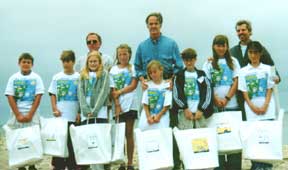Carper calls for horseshoe crab preservation and awards regional contest winners
June 13, 2000
Broadkill Beach on the verge of becoming official horseshoe crab sanctuary

BROADKILL BEACH – Governor Thomas R. Carper today saluted regional students for their horseshoe crab preservation efforts and he continued to press the federal government to ban fishing of the 350-million-year-old species around the mouth of Delaware Bay.
To intensify the horseshoe crab conservation efforts, officials also announced that Broadkill Beach should be a horseshoe crab sanctuary by the end of the summer, a declaration that will officially ban the harvesting of the species along the community’s 3.8-mile coastline.
Carper said, “The young people we are honoring here today are our future environmental stewards and we appreciate their interest in a unique and important species to Delaware. The fate of the horseshoe crab is critical and Delaware Bay contains one of the world’s greatest concentrations of this species, which is a key part of The First State’s natural resources. We must take additional steps to implement sound, scientific-based conservation measures for horseshoe crabs.”
The Governor recognized nine first-place award winners from Delaware and three from Maryland in the 2nd Annual Just flip ‘em ! ® Horseshoe Crab Conservation T-shirt Drawing Contest, sponsored by the Milton-based Ecological Research & Development Group, Inc. (ERDG). This year’s contest, which attracted nearly 500 entrants from elementary schools in Delaware and Maryland, is designed to raise student and community awareness about the importance of horseshoe crabs.
The shoreline along Delaware Bay is the second largest feeding area for northbound migratory shorebirds in the Northern Hemisphere. Each May, thousands of shorebirds depend on horseshoe crab eggs from the Delaware Bay as an abundant food source to fuel long-distance flights to their Arctic breeding grounds. Additionally, horseshoe crabs have proven valuable to both the bait and pharmaceutical industries.
“The term ‘Just flip ‘em ! ® brings attention to the high mortality from horseshoe crab stranding along our beaches and encourages support for the preservation of these ancient mariners,” said ERDG President Glenn Gauvry. “Over-harvesting, loss of habitat, stranding and pollution are the primary causes for horseshoe crabs’ dramatic population decline.”
Researchers estimate that the horseshoe crab population continues to decline along Delaware Bay. In May, Gov. Carper urged U.S. Secretary of Commerce William B. Daley to institute a horseshoe crab moratorium – closing area waters to horseshoe crab trawling and fishing within a 30-mile radius from the mouth of Delaware Bay. Carper, who has not received an answer from the federal government yet, indicated that the action is necessary to complement the restrictions established by the surrounding states to ensure the health and protection of horseshoe crabs along the Atlantic coast. Carper called for the National Marine Fisheries Service (NMFS), which falls under the responsibility of the Commerce Department, to immediately implement the moratorium.
Gauvry indicates that Broadkill Beach is nearing full sanctuary status with 70 percent of Broadkill’s bayfront property declared off-limits to harvesting and, according to Gauvry, ERDG has met no opposition in banning horseshoe crab harvesting along Broadkill. Jim Bailey, President of the Broadkill Beach Preservation Association, attended the event to offer his group’s support for horseshoe crab conservation. To further the horseshoe crab cause, ERDG is also planning to build the country’s first horseshoe crab museum and research center in Milton. The only other museum of this type is located in Kasaoka, Japan. ERDG, which has already purchased a building in downtown Milton, has drawn widespread support for the project from community and elected officials.
“Many thanks to ERDG, the people of Broadkill Beach and these talented students for their efforts to educate all of us about the valuable horseshoe crab,” said Carper. “Hopefully, this message will be heard by the officials at the National Marine Fisheries Service and they will implement the moratorium that we called for six weeks ago.”
Each of this year’s Just flip ‘em ! ® contest winners received a drawing kit, five Just flip ‘em ! ® T-shirts, a poster of the winning design and plenty of information about horseshoe crabs. The unique T-shirt has the 12 winning student designs compiled into one spectacular image. ERDG is a non-profit organization whose mission is to seek solutions that prevent or mitigate damage to native wildlife populations and habitats due to human activities. ERDG accomplishes this goal through scientific research and development, environmental planning and management and public education.